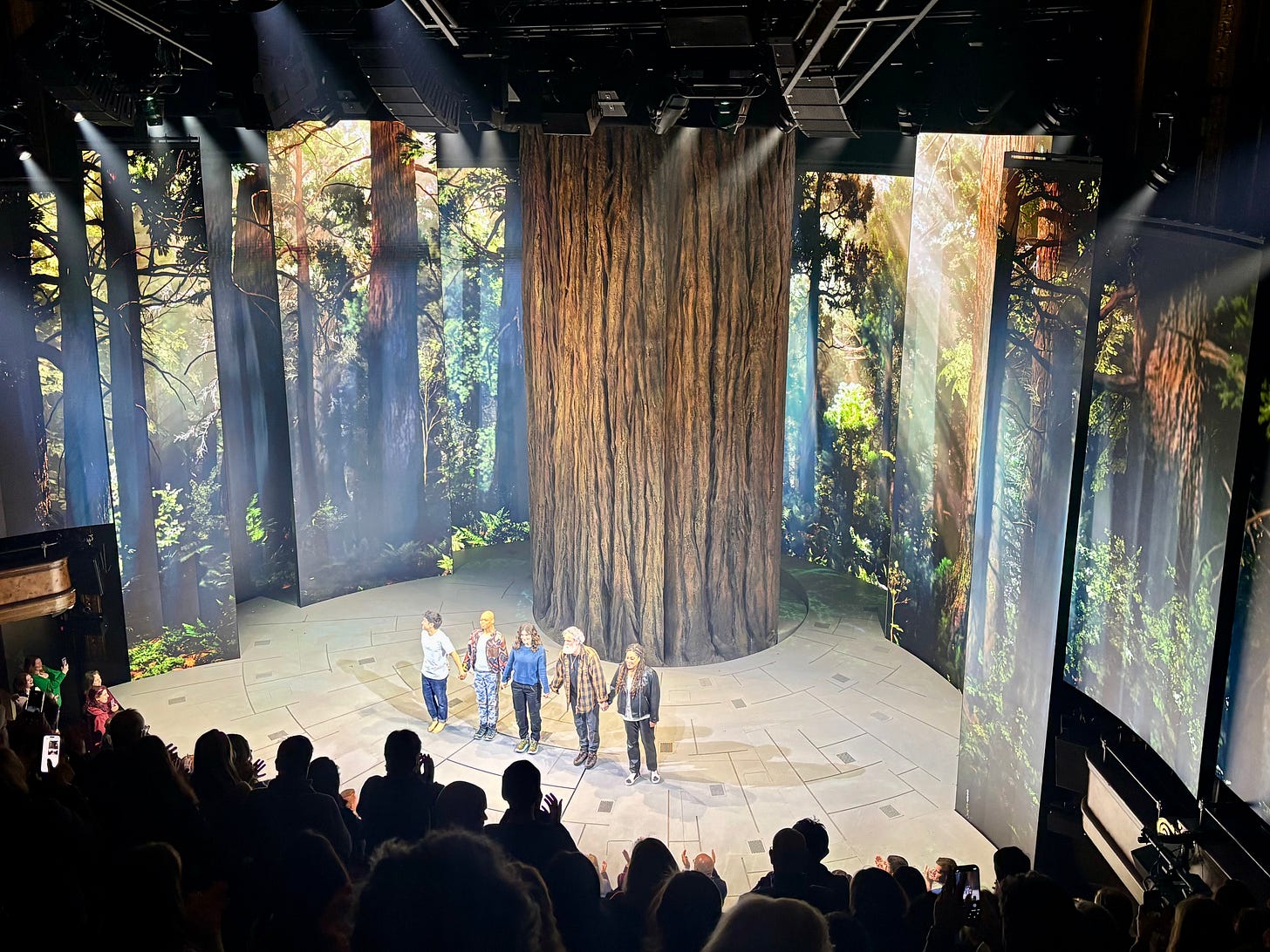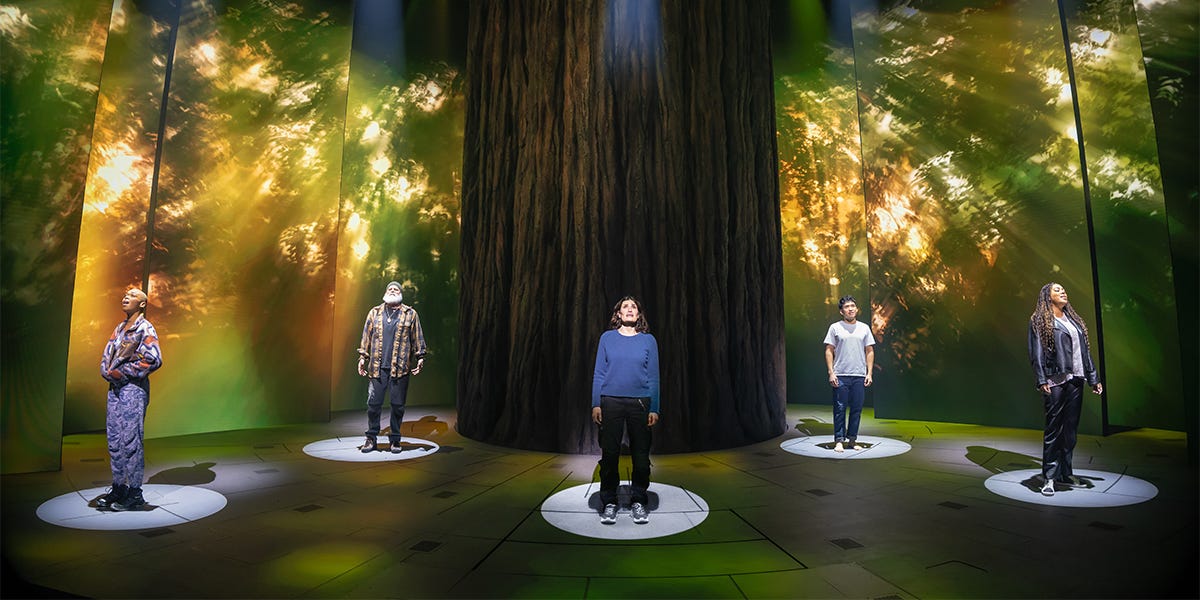"Redwood" Review: A flawed but moving exploration of grief and nature
The awe you experience staring up at a massive redwood tree is just the type of feeling that inspires a song in a musical. Words fail, so you have to sing. The new musical “Redwood,” playing on Broadway at the Nederlander Theatre, aims to capture this feeling. It’s a moving and engaging show, but an uneven score, and sometimes clunky storytelling, keep it from reaching its full height.
Idina Menzel, that superstar of the theatre, and book writer/director Tina Landau conceived of the story, bringing in newcomer Kate Diaz to write the score. Menzel plays Jesse, a bereaved mother who leaves her life behind in New York to drive out west, eventually reaching the redwood forest in Eureka, CA. Something about the redwoods stops her and so she sets herself down. When two forest researchers find her sitting on the forest floor, she convinces them to show her how to climb. Eventually, they allow her to stay on a platform high up in the tree’s canopy for many days. Her first night is rough, as she wrestles with her complex feelings about her son’s death. When she eventually comes down, she is changed by the experience and more ready to confront her grief.
The story is genuinely moving, especially in its final third. That is when the show finally gets at the true depth of Jesse’s grief, as well as the power of human connections with non-human beings—in this case the redwoods. While mostly compelling, Landau’s dialogue scenes are often mechanical, moving the plot along without a lot of nuanced character development. Conflicts sometimes erupt out of nowhere and lots of cross-talk can make it hard to keep up.

Diaz’s score includes both good songs and duds. Menzel nails the high notes, of course, but the writing doesn’t really justify them. Many songs lack the emotional depth and dynamism that earn those emotional climaxes; I found myself enjoying the ballads and quieter songs more for this reason. Strangely for a star vehicle, some of the best songs are given to other performers, such as a beautiful ballad sung by Jesse and her wife (De’Adre Aziza) and an ode to repairing the world sung by one of the forest researchers (Khaila Wilcoxon). Jesse’s son (Zachary Noah Piser) sings a powerful song towards the end inviting his mom to recommit to living, even without him. It must be tough to share a stage with Menzel, but these performers were excellent, doing a lot with their underwritten characters and singing beautifully.
Other songs felt formulaic, with somewhat cliched lyrics. The all-important scene-setting opening number includes dramatic light and video cues but little coherent exposition or storytelling. Fortunately, I knew going in that Jesse’s son had died, but if you didn’t, you’d be confused. Throughout, I couldn’t make out some of Menzel’s lyrics, especially when she was singing while suspended on the side of the tree in midair—very cool, but with the casualty of lyric clarity.

Despite the show’s unusual premise, Landau mostly relies on realism to tell the story. Menzel’s character spends much of the show on a hanging platform halfway up a beautiful redwood tree at center stage (scenic design is by Jason Ardizzone-West). Humongous LED screens flank the tree and extend far out beyond the stage (video design is by Hana S. Kim). The show’s best moments are when Jesse communes with the forest. In her first encounter, she slowly gazes up, and the video shifts to match her view, panning up through real-world footage of trees and then back down. It’s dazzling!
In another engaging scene, Menzel and the two forest researchers climb up the tree together, performing aerial dance choreography that is beautiful and unlike anything I’ve seen on a stage before. The “vertical movement/choreography” is credited to Melecio Estrella from the group BANDALOOP, based in Oakland, CA. I had seen the group’s work before, performing on the Campanile (bell tower) at UC-Berkeley, and it is mesmerizing. “Redwood” only has two such sequences, and that’s a shame, because it misses an opportunity to do more of the storytelling through movement. For much of the show’s single act, Menzel is standing, sitting, or lying on that platform, physically constrained from too much movement lest she fall off. (Even in scenes on the ground, there’s very little to show visually the emotional twists and turns of her character.) This constraint doesn’t serve the show. Her story is already so interior, the lack of physical expression makes it harder for the audience to get inside her experience.

And so “Redwood” is a bit of a study in contrasts: a very interior story about Jesse’s grief, juxtaposed with the massiveness of redwoods; a story about nature’s power to heal us, told through cutting-edge technology; a small cast with minimal movement, surrounded by a massive array of LED screens. At times I felt like I was at an IMAX theatre or theme park attraction—complete with musical scoring you’d find in a nature documentary. The video is so vivid and overwhelming, Menzel often looks small on stage in comparison. This choice certainly advances the feeling of smallness one gets looking at a redwood, but for live theatre shouldn’t the human beings be the main focus? It’s hard for a person—mostly standing still—to compete for our attention with this kind of overwhelming, colorful video. The video design is most effective, therefore, when it provides steady imagery of the redwood canopy. That’s when we can keep our focus on the characters and their story.

Menzel has originated two of musical theatre’s most iconic roles—Maureen in “Rent” and Elphaba in “Wicked”—and is beloved by a generation of kids for voicing Elsa in the film “Frozen.” Beside these, her Broadway resume is sparse. She hasn’t had the kind of star turn in a big budget revival that others of her stature have, either because directors passed her over, or for lack of interest on her part. Either way, I respect that in her first time on Broadway in years, she is taking a risk on a new, unusual work and giving a major boost to a new composer.
I was ultimately moved by the show’s portrayal of the grief of a parent for her child and the healing power of nature. I’ve been to the same redwood forest portrayed in the show, and it truly is inspiring. “Everybody dies,” Jesse’s son sings to her at the end, “so while you’re alive, live.” When we lose sight of that, maybe nature can show us how.
Open run at the Nederlander Theatre on Broadway. 110 minutes with no intermission. Disclosure: I saw the show in previews, so there may have been changes before it was “frozen” before its opening night on February 13.
Learn more: New York Times: Idina Menzel played Elphaba and Elsa. Now she’s going out on a limb.
See you at the theatre!




